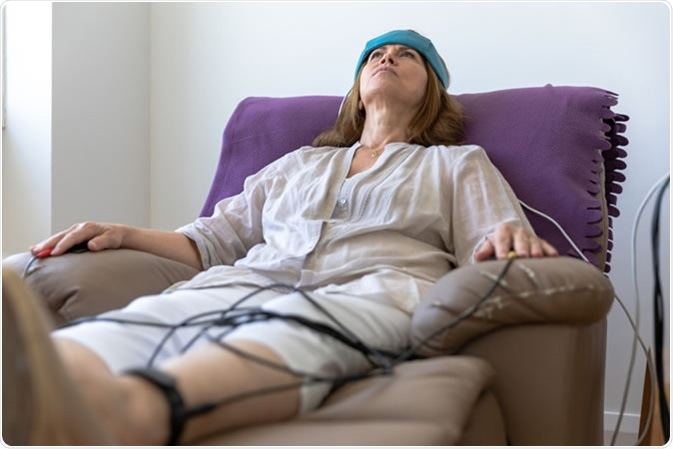Skip to:
What is Biofeedback Therapy?
Biofeedback, or biofeedback therapy, is a technique in which patients learn to voluntarily control certain bodily processes. Traditionally, biofeedback makes use of sensory electrical equipment that is able to convert physiological output signals into visual and auditory cues. Biofeedback therapy involves a specialist practitioner to guide the therapy and train patients.

Biofeedback Patient. Image Credit: Malt Digital Agency / Shutterstock
Surface electrodes are applied to specific body parts to monitor common physiological parameters and provide information (the biofeedback). A computer screen or tablet device displays the feedback from their body so that the practitioner and patient can aim to improve control over the body’s physiologic processes.
Commonly assessed biofeedback parameters include heart rate, breathing rate, skin temperature and skin conductance. By providing real-time data, much like an EEG or ECG, the patients become aware of their physiology and they can learn techniques to help control these physiological processes.
The goal of biofeedback therapy is help make patients aware of the thoughts, sensations and behaviours related to their own physiology. As such, over time with guided training, patients are able to self-regulate without biofeedback. Therefore biofeedback can be viewed as training or education, rather than treatment.
Biofeedback has been shown to work for several conditions with varying efficacies. These include urinary incontinence, anxiety, ADHD, chronic pain, epilepsy, and to some extent asthma, erectile dysfunction and IBS.
What Is Biofeedback? Center for Brain Training's, Mike Cohen, Discusses Types of Biofeedback
Does Biofeedback Therapy Work for Headaches?
Studies have shown varying efficacies in using biofeedback therapy in the treatment of headaches. Biofeedback therapy is an established alternative approach in the specific treatment of migraine and tension-type headaches.
A study by Odawara et al (2015), compared patients with migraine receiving biofeedback and those simply on a wait-list (not receiving any treatments). Patients receiving biofeedback therapy reported a significant reduction in headache intensity after therapy and reduced headaches compared to those who did not receive treatment.
Not only did biofeedback therapy resulted in a decreased headache duration by 1.9 days/week, it also reduced the frequency of high intensity headaches by 2.4 days per wekk. Consequently, biofeedback therapy improved headache-related disability, psychological stress, depression, anxiety and irritation.
In contrast, a 2009 study by Mullaly et al found that biofeedback provided no additional benefit compared to other simpler relaxation techniques, specifically for the treatment of migraines and tension-headaches. These include breathing exercises, muscle relaxation, mindfulness meditation, all of which are also included in biofeedback therapy.
However, there was an issue with adherence in this group, with large numbers of participants dropping out and a lack of a control group that did not receive biofeedback. Nonetheless, both biofeedback and simpler relaxation techniques led to a reduction in both frequency and severity of headaches.
Taken together, these studies show that biofeedback may improve headache duration, intensity and frequency. The mechanisms underlying how biofeedback promotes the alleviation of symptoms is still largely unclear, however it could be through promoting relaxation. As such, some studies have found that simpler relaxation techniques are just as effective as biofeedback therapy.
Biofeedback can however make one aware of their physiology and over time enable patients to recognise their physiological behaviours so that they can begin relaxation techniques. Over time, this can greatly reduce the dependence on medications and promote natural self-regulation of symptoms.
Sources:
- Frank et al, 2010. Biofeedback in medicine: who, when, why and how? Ment Health Fam Med. 7(2):85-91. https://www.ncbi.nlm.nih.gov/pubmed/22477926
- Mullally et al, 2009. Efficacy of biofeedback in the treatment of migraine and tension type headaches. Pain Physician. 12(6):1005-11. https://www.ncbi.nlm.nih.gov/pubmed/19935987
- Odawara et al, 2015. Real-Time Assessment of the Effect of Biofeedback Therapy with Migraine: A Pilot Study. Int J Behav Med. 22(6):748-54. https://www.ncbi.nlm.nih.gov/pubmed/25670026
Further Reading
Last Updated: Nov 10, 2019